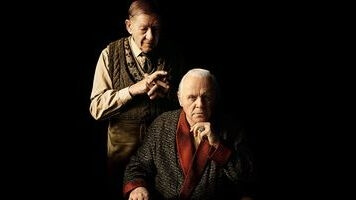An ace cast makes the Starz movie The Dresser look spiffy

In 1980, Ronald Harwood’s play The Dresser opened in London, with Tom Courtenay playing Norman, the faithful backstage attendant to a great actor who long ago had begun sliding into dementia and frailty. Courtenay was nominated for a Tony two years later when he took the role to Broadway, and then got an Oscar nod for director Peter Yates’ 1983 movie, where he starred opposite an also-Oscar-nominated Albert Finney as “Sir.” At the time, Courtenay and Finney were in their mid-40s, and though the film was set during WWII, it functioned just as well as a wistful paean to two aging actors who’d electrified the British stage and cinema throughout the 1960s.
The new TV movie version of The Dresser (which originally aired on BBC Two late last year, and comes to Starz this Memorial Day) stars Ian McKellen as Norman, and Anthony Hopkins as Sir. Age-wise, McKellen and Hopkins are essentially peers to Courtenay and Finney, both of whom are still very much alive—with Courtenay recently having given a magnificent performance in 45 Years. But career-wise, both had their most popular successes much later. So The Dresser’s real-life backstage echoes are much different this time out. This Dresser is less of a nostalgia piece and more of a statement of purpose from two actors who’ve become better-known for their work in Hollywood blockbusters than for their roots in the theater.
Director Richard Eyre keeps his take on Harwood’s play more stage-bound than Yates did, resisting the urge to “open it up.” Some of what the earlier film dramatized in its opening scenes—establishing who Sir is, and what’s been happening to his mental and physical health—is merely described by Norman here in an extended conversation with his boss’s wife, “Her Ladyship” (played by Emily Watson). Then the rest of the story plays out over the course of one evening, in and around a dressing room and a stage. While Sir’s touring company prepares to mount a production of King Lear in a Northern English city—in the middle of an air raid, no less—Norman works his magic to get his confused, obstinate actor ready to perform.
Roughly an hour out of The Dresser’s nearly two-hour running time is what the industry trades would call “a two-hander”—with just a pair of performers in a room, interacting. But what’s always made Harwood’s story so effective is the way it uses just a handful of additional characters to build out Sir’s world. Besides Her Ladyship, Norman serves as a buffer between Sir and his company, which includes an angry aspiring playwright played by Tom Brooke and a meek lifelong bit player played by Edward Fox (who was also in the 1983 movie, in Brooke’s role). Norman also fends off the justified concern of Madge (Sarah Lancashire), the stage manager who’s perpetually certain that Sir can’t go on. All of these actors—plus Vanessa Kirby as a starstruck ingenue—get only a few minutes each on-screen. But that’s enough to establish the destructive impact that one demanding Shakespearean has had on anyone who’s come into his orbit, as well as showing how just a few hours a night in front of an appreciative audience can make all of the hassle worth enduring.
Eyre misses some of the humor that Yates brought out in his Dresser (in particular one sight gag involving Othello blackface, which barely registers as comic this time out); and the formerly semi-subversive gay content of the 1983 film is no longer as daring as it once was (which is an encouraging sign of our more progressive times, honestly). But Eyre retains the intimacy of the dressing room scenes that made Yates’ take so memorable. And there’s still plenty of snap in Harwood’s lines, from Sir saying of a colleague, “I saw his Lear… I was pleasantly disappointed,” to him insisting he won’t read his underling’s play and then casually inquiring, “Is there a part for me?”
But as always, The Dresser rises and falls on the strength of its central duo, and it’s hard to imagine two currently working actors who could rival Courtenay and Finney as well as McKellen and Hopkins do. McKellen’s Norman is a little less fussily nannyish than Courtenay’s, and a little more like an eternally patient parent trying to get a cranky toddler dressed and ready for school. He knows that if he can just get Sir to his first cue, instinct will kick in. He also knows that facilitating another memorable performance is going to have to be its own reward.
As for Hopkins, his turn as Sir is the best he’s been in a movie—television or otherwise—since his phenomenal run of films in the 1990s. He plays the character as at once heinous and pitiable, and is attuned throughout to the many different kinds of faces that actors put on, in public and in private. While he’s begging Norman to remind him of the opening lines for his 227th turn as Lear, he also seems to be searching his memory banks for what he’s supposed to say to the people he spends time with every day. His Sir is absolutely magnetic, in part because he always seems on the brink of slipping out of lucidity, but also because he’s a testament to how great artists often exist just outside the rules of polite society.
Seeing masterful actors and acting on television isn’t exactly a rarity these days. Yet The Dresser still feels like something special, if only because it’s a throwback to the era when premium cable channels treated theatrical adaptations as part of their mission to distinguish themselves from network TV. There’s nothing immediately grabby about this film, beyond the promise of watching two of the best actors of the past half-century dance gracefully around each other for the better part of two hours. But sometimes that’s enough—especially when neither man misses a step.